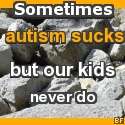
Do you use your kids' names as a password? Your pet's name, that you talk about on your blog? You might want to rethink that strategy. Seriously. I have a friend right now in shock because she had an easy-to guess password. Someone hacked her gmail account. She lost everything. This includes her email, her blogs (which were on Blogger, owned by, who else? Google). What's more, her passwords were in a folder, in her gmail account. So, the person who hacked her has it all. She is left with nothing and is scrambling to undo the damage that can be done all over the Internet. Meanwhile, she is locked out of everything Google. Can you imagine? Another reason computing in the Cloud has me a bit a-skeered...Google owns my life.
It is easy to get lax, but here's the deal, from me to you. If you have a word from the dictionary as a password, change it, RIGHT NOW. I'll wait. ...
...are you back? This is why: there are programs that just run dictionary words and common numbers trying to hack your password. Make no mistake, there are people out there, right now, as I write this, trying to hack you. A combination of letters, numbers and upper and lower case characters are the best chance you have to keep those out who want in to your accounts. Go ahead, make use of that shift bar. Also, while I am on the subject, make a new password for every single service you use online. I know it's a pain, but this way, if someone gets into one, they don't necessarily get into everything.
I know, I know..it's hard to keep track of that many passwords, but you have some options. If you are on a Mac, you have Keychain to help you. You can store passwords, but also generate them as well. On a PC, you can use Password Safe, an application that you download and use locally. It creates files for your passwords, and a master password to protect them all. What's more, it is open source, so you don't pay anything for it. As for what you find on the Internet, I would be very, very wary of any online password meters. How do you know that your password is not being snarfed? Keep it local! It's also smart to write those puppies down in case you have a hard drive crash. This actually happened to me in July, and I lost half of my passwords. Luckily, I did have most of them written down, and backed up.
I don't want to hear that you have been hacked, so change that password. Change it often. And store your passwords locally, not ONLINE where they can be hacked. Your online identity, treat it the way you would your bank information. Treat it the way you would your first born child. Guard it.
Consider this my public service announcement to all of you. Much love. Peace out.
T, who changed mine the minute I heard about this














![Reblog this post [with Zemanta]](http://img.zemanta.com/reblog_e.png?x-id=bf437b01-99be-4832-ba28-6d90bed410c8)
































